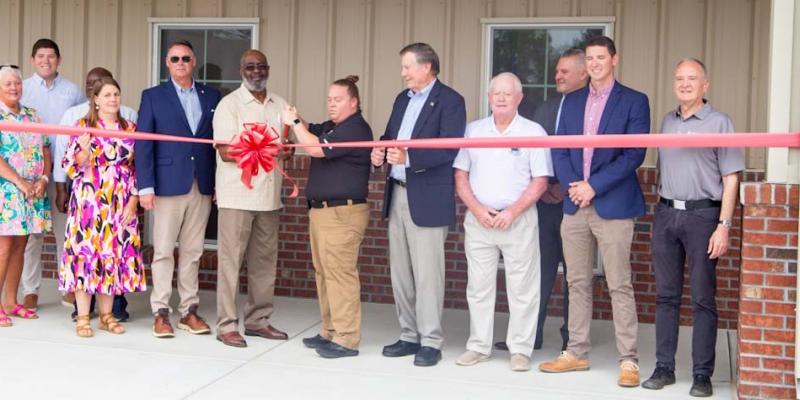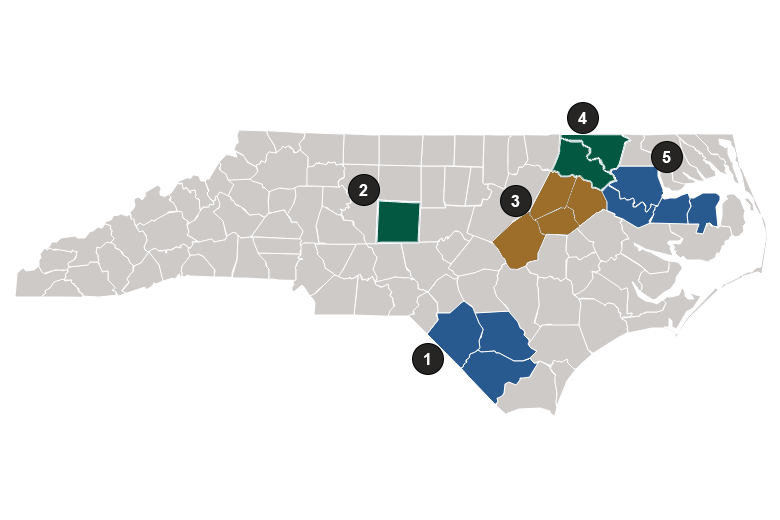
USDA Rural Development State Director Participates in Ribbon Cutting with Jones County Emergency Medical Services
USDA Rural Development State Director Robert Hosford along with representatives from North Carolina Congressional offices and Jones County leadership participated in a ribbon cutting ceremony to celebrate the opening of the new Jones County emergency medical services building in Trenton today.
Rural Development invested $1 million through a USDA Emergency Rural Healthcare Grant to construct a new emergency medical services building and renovate the county’s emergency operations center. Both facilities are vital for the continued safety of Jones County rural residents.
Overview
Of North Carolina’s 100 counties, 80 are considered rural or rural in character, depending on the definition of rural and data sets consulted.
In these communities, more than 70 percent of businesses are considered very small, with less than 10 employees each. Since 2000 manufacturing jobs have decreased and income levels have been stagnant, with significantly lower median household incomes for people of color in rural areas.
As the rural population ages, so have the water and wastewater infrastructure and housing stock. In addition, higher numbers of lower-income renters and homeowners are spending more than 30 percent of their income on housing.
The Rural Partners Network is working in five North Carolina community networks that encompass fourteen rural counties. While each community network is unique, they share opportunities to grow their economies and quality of life through focused improvements and investments in water and wastewater systems; increased access to small business capital; downtown redevelopment; and affordable, updated housing across the board and especially for low-and very-low-income families.
The Rural Partners Network and our many agency and philanthropic partners support the community leaders, business and industry, nonprofits, faith-based organizations, and many other key sectors of rural North Carolina - including the Haliwa-Saponi, Lumbee, Meherrin, and Waccamaw Siouan Tribes – to empower local people define their quality of life and create the future they envision. Of North Carolina’s 100 counties, 80 are considered rural or rural in character, depending on the definition of rural and data sets consulted.
In these communities, more than 70 percent of businesses are considered very small, with less than 10 employees each. Since 2000 manufacturing jobs have decreased and income levels have been stagnant, with significantly lower median household incomes for people of color in rural areas.
As the rural population ages, so have the water and wastewater infrastructure and housing stock. In addition, higher numbers of lower-income renters and homeowners are spending more than 30 percent of their income on housing.
The Rural Partners Network is working in five North Carolina community networks that encompass fourteen rural counties. While each community network is unique, they share opportunities to grow their economies and quality of life through focused improvements and investments in water and wastewater systems; increased access to small business capital; downtown redevelopment; and affordable, updated housing across the board and especially for low-and very-low-income families.
The Rural Partners Network and our many agency and philanthropic partners support the community leaders, business and industry, nonprofits, faith-based organizations, and many other key sectors of rural North Carolina - including the Haliwa-Saponi, Lumbee, Meherrin, and Waccamaw Siouan Tribes – to empower local people define their quality of life and create the future they envision.
Community Networks in North Carolina
-
Robeson, Bladen, Columbus County Community Network
Counties of Robeson, Bladen, Columbus.
-
Glow House Society Community Network
County of Randolph .
-
Wilson, Edgecombe, Nash, and Johnston Community Network
Counties of Wilson, Edgecomb, Nash, Johnston.
-
Halifax-Northampton Community Network
County of Halifax‐North Hampton.
-
Albemarle-Roanoke Community Network
Counties of Bertie, Martin, Tyrrell, Washington.

Rural Partners Network Contacts for North Carolina
-

Robert Hosford
State Director -

George Vital
Statewide Senior Community Liaison

